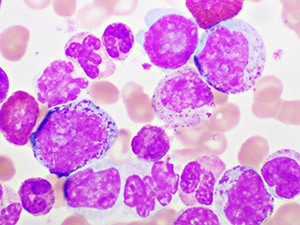Asciminib Approved as First-line Targeted Therapy for Chronic Myeloid Leukemia
The therapeutic was approved for certain patients with Philadelphia chromosome-positive chronic myeloid leukemia.
The U.S. Food and Drug Administration (FDA) has granted accelerated approval to asciminib (Scemblix) for adults with newly diagnosed, Philadelphia chromosome (Ph)-positive chronic myeloid leukemia (CML) in chronic phase.
Asciminib is a tyrosine kinase inhibitor (TKI), a type of targeted therapy that blocks the tumor-promoting activity of certain proteins. Asciminib inhibits the BCR-ABL fusion protein that is produced by an aberrant DNA fragment known as Ph. BCR-ABL promotes uncontrolled growth of white blood cells, leading to the development of blood cancers, including CML. While other TKIs approved for first-line treatment also target this fusion protein, asciminib targets a different region of the protein that may help bypass treatment resistance.

Asciminib was previously approved for patients who have received prior TKI treatment for Ph-positive CML in chronic phase as well as for patients whose Ph-positive CML harbors the T315I mutation. The latest approval makes asciminib available to patients who have not yet undergone treatment for the disease, regardless of whether their cancer has the T315I mutation.
The approval was based on results from the multicenter, randomized, active-controlled, open-label phase III ASC4FIRST trial, in which 405 patients who were newly diagnosed with Ph-positive CML in chronic phase were randomly assigned (1:1) to receive either asciminib or an investigator-selected TKI, which served as the standard-of-care control.
Compared to 49% of patients in the control group, 68% of asciminib-treated patients experienced a major molecular response at 48 weeks, meaning they had low levels of the BCR-ABL gene.
The recommended dose for asciminib to treat newly diagnosed, Ph-positive CML in chronic phase is 80 mg once daily or 40 mg twice daily.
CML is a slow-growing cancer of the blood and bone marrow. In Ph-positive CML, the BCR-ABL fusion protein disrupts the activity of the stem cells that give rise to all blood cells, leading to abnormal white blood cells that can accumulate and crowd out healthy blood cells. Chronic phase is the earliest stage of CML, when the abnormal white blood cells comprise less than 10% of the total population of blood cells. According to federal statistics, it was estimated that 9,280 individuals would be diagnosed with CML and 1,280 patients would die of the disease in the United States in 2024.
The FDA rendered its decision on October 29, 2024. Accelerated approval means that continued approval may be contingent upon a confirmatory trial. Please check this FDA web page for the latest information about any accelerated approvals in oncology that may have been subsequently withdrawn and are no longer FDA-approved. In addition, this resource has the most updated information on all therapeutics regulated by the FDA.